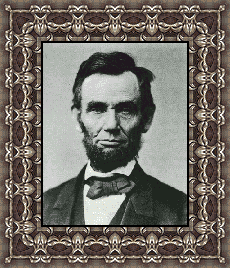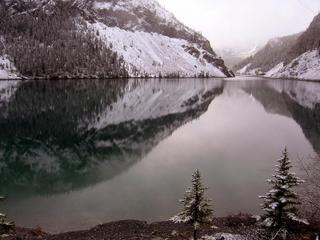William Blake (1757-1827)
America: A Prophecy Preludium (excerpt)
1The shadowy Daughter of Urthona stood before red Orc,
2When fourteen suns had faintly journey'd o'er his dark abode:
3His food she brought in iron baskets, his drink in cups of iron:
4Crown'd with a helmet and dark hair the nameless female stood;
5A quiver with its burning stores, a bow like that of night,
6When pestilence is shot from heaven: no other arms she need!
7Invulnerable though naked, save where clouds roll round her loins
8Their awful folds in the dark air: silent she stood as night;
9For never from her iron tongue could voice or sound arise,
10But dumb till that dread day when Orc assay'd his fierce embrace.
11"Dark Virgin," said the hairy youth, "thy father stern, abhorr'd,
12Rivets my tenfold chains while still on high my spirit soars;
13Sometimes an Eagle screaming in the sky, sometimes a Lion
14Stalking upon the mountains, and sometimes a Whale, I lash
15The raging fathomless abyss; anon a Serpent folding
16Around the pillars of Urthona, and round thy dark limbs
17On the Canadian wilds I fold; feeble my spirit folds,
18For chain'd beneath I rend these caverns: when thou bringest food
19I howl my joy, and my red eyes seek to behold thy face--
20In vain! these clouds roll to and fro, and hide thee from my sight."
21Silent as despairing love, and strong as jealousy,
22The hairy shoulders rend the links; free are the wrists of fire;
23Round the terrific loins he seiz'd the panting, struggling womb;
24It joy'd: she put aside her clouds and smiled her first-born smile,
25As when a black cloud shews its lightnings to the silent deep.
26Soon as she saw the terrible boy, then burst the virgin cry:
27"I know thee, I have found thee, and I will not let thee go:
28Thou art the image of God who dwells in darkness of Africa,
29And thou art fall'n to give me life in regions of dark death.
30On my American plains I feel the struggling afflictions
31Endur'd by roots that writhe their arms into the nether deep.
32I see a Serpent in Canada who courts me to his love,
33In Mexico an Eagle, and a Lion in Peru;
34I see a Whale in the south-sea, drinking my soul away.
35O what limb-rending pains I feel! thy fire and my frost
36Mingle in howling pains, in furrows by thy lightnings rent.
37This is eternal death, and this the torment long foretold."
38The stern Bard ceas'd, asham'd of his own song; enrag'd he swung
39His harp aloft sounding, then dash'd its shining frame against
40A ruin'd pillar in glitt'ring fragments; silent he turn'd away,
41And wander'd down the vales of Kent in sick and drear lamentings.
Notes
1] America, A Prophecy, was first engraved in 1793, in eighteen plates, and deals with Blake's interpretation of the American Revolution. Orc (partly from Latin orcus, hell) is the spirit of freedom inspiring the American revolt. He is associated with the classical Titans, with the Norse god Loki, also imprisoned in a "cavern" (line 18) under a mountain, and with Esau, the rightful heir of Isaac (cf. "hairy youth" in line 11 with Gen. 27: 11). The "Daughter of Urthona" is the land of America which a new civilization is taking possession of.
Urthona: the creative power of the imagination, later identified with Los, the hero of most of Blake's prophecies.
2] fourteen: the age of puberty.
3] iron. Urthona or Los in Blake is a blacksmith: cf. Isa. 54.16.
12] tenfold: an allusion to the ten commandments of the moral law, used to restrain the impetus toward freedom.
13] eagle. The four animals mentioned here and below represent both the four elements and the four quarters of America.
28] Africa. The place of Orc's imprisonment is sometimes given as Mount Atlas in north-west Africa.
Online text copyright © 2004, Ian Lancashire for the Department of English, University of Toronto.
Published by the Web Development Group, Information Technology Services, University of Toronto Libraries.
Original text: William Blake, America, A Prophecy (Lambeth, 1793). Facsimile edn., intro. G. E. Bentley, Jr. American Blake Foundation, 1974. PR 4144 A5 1974 ROBA.
First publication date: 1793
RPO poem editor: Northrop Frye
RP edition: 3RP 2.290.
Recent editing: 4:2002/3/14*1:2003/7/30
Form note: unrhymed


